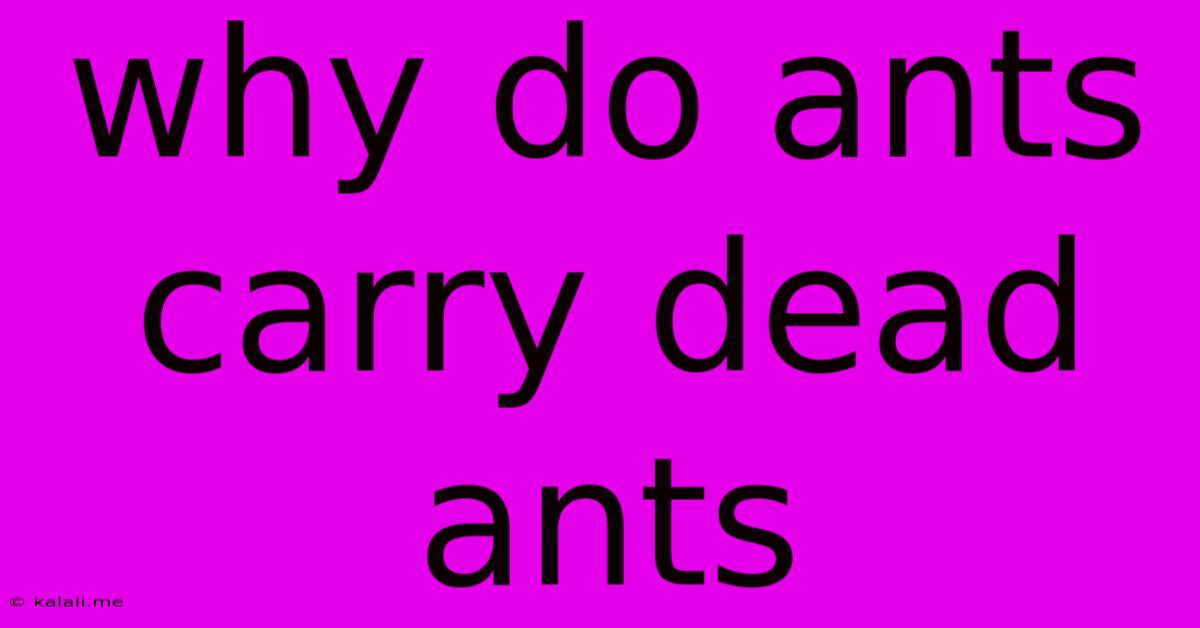Why Do Ants Carry Dead Ants
Kalali
May 21, 2025 · 3 min read

Table of Contents
Why Do Ants Carry Dead Ants? The Mystery of the Ant Funeral
Have you ever observed a line of ants diligently carrying what appears to be a deceased ant comrade? It might seem like a somber funeral procession, a display of ant-like grief. But the reality is far more complex and fascinating than simple mourning. This behavior, known as ant death removal, is crucial for the survival and hygiene of the entire colony. It's not about sentimentality; it's about preventing disease and maintaining a clean, healthy nest.
Understanding the Driving Forces Behind Ant Death Removal
Several factors contribute to why ants carry away their dead. These aren't solitary actions; it's a coordinated effort driven by chemical communication and instinct. Let's break down the key reasons:
-
Disease Prevention: Dead ants can quickly become breeding grounds for bacteria, fungi, and parasites. Removing corpses prevents the spread of pathogens throughout the colony, protecting the health of the living ants. This is a crucial aspect of ant colony hygiene and overall survival. The rapid removal of carcasses minimizes the risk of an epidemic decimating the colony.
-
Necrophoric Behavior: This is the specific term for the carrying away of corpses. It's not driven by emotional attachment, but rather by a chemical cue released by the deceased ant. This chemical, often a fatty acid called oleic acid, triggers a response in the living ants, signaling them to pick up and dispose of the dead body. This is a key element of their sophisticated communication system.
-
Maintaining Nest Hygiene: A clean nest is essential for the overall health and productivity of the colony. Removing dead ants helps maintain a sanitary living environment, reducing the risk of disease and infestation. Keeping the colony clean is vital for the survival and efficiency of the entire community.
-
Resource Management: While seemingly insignificant, the body of a dead ant represents a loss of resources for the colony. Removing the body prevents wasted resources and potential competition for food within the colony. This is an efficient strategy for optimizing resource allocation.
-
Identification of Death: Ants don't necessarily need to visually identify a dead ant. The chemical signals mentioned above are sufficient for triggering the necrophoric response. They are able to detect subtle changes in the chemical composition of their nestmates, indicating death. This precise chemical detection system is remarkable in its effectiveness.
Debunking Myths about Ant Funerals
While the behavior might resemble a funeral, it's not driven by empathy or understanding of death in the human sense. It's a purely instinctual and hygienic behavior critical for the colony's survival. The focus is on preventing the spread of disease and maintaining a clean living space.
Further Research and Exploration
The study of ant behavior, especially their death-removal processes, continues to fascinate scientists. Further research into the specific chemicals involved and the intricacies of their communication systems offers valuable insights into insect societies and the principles of collective behavior.
In conclusion, ants carrying dead ants is not a display of mourning, but a crucial aspect of colony hygiene, disease prevention, and resource management. It's a fascinating example of how instinct and chemical communication contribute to the survival and success of a complex social insect colony. The sophisticated mechanisms involved in this process highlight the remarkable efficiency and adaptive capabilities of these tiny creatures.
Latest Posts
Latest Posts
-
How To Delete Saves From Steam Cloud
May 22, 2025
-
Find And Replace In Vi Editor
May 22, 2025
-
Car Wont Jump Start But Lights Come On
May 22, 2025
-
How Do You Take The Drain Out Of A Bathtub
May 22, 2025
-
Blue Smoke Coming Out Of Tailpipe
May 22, 2025
Related Post
Thank you for visiting our website which covers about Why Do Ants Carry Dead Ants . We hope the information provided has been useful to you. Feel free to contact us if you have any questions or need further assistance. See you next time and don't miss to bookmark.